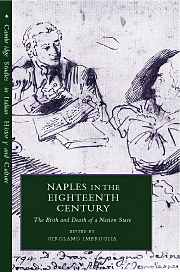Book contents
- Frontmatter
- Contents
- List of abbreviations
- Introduction
- 1 The capital and the provinces
- 2 The Court: power relations and forms of social life
- 3 The arrogance of the market: the economy of the Kingdom between the Mediterranean and Europe
- 4 Enlightenment in eighteenth-century Naples
- 5 The feudal question, judicial systems and the Enlightenment
- 6 Intellectuals and academies
- 7 Music and Enlightenment
- 8 Antiquarian studies in Naples at the end of the eighteenth century. From comparative archaeology to comparative religion
- 9 How not to finish a revolution
- Bibliography
- Index of names
- CAMBRIDGE STUDIES IN ITALIAN HISTORY AND CULTURE
6 - Intellectuals and academies
Published online by Cambridge University Press: 14 October 2009
- Frontmatter
- Contents
- List of abbreviations
- Introduction
- 1 The capital and the provinces
- 2 The Court: power relations and forms of social life
- 3 The arrogance of the market: the economy of the Kingdom between the Mediterranean and Europe
- 4 Enlightenment in eighteenth-century Naples
- 5 The feudal question, judicial systems and the Enlightenment
- 6 Intellectuals and academies
- 7 Music and Enlightenment
- 8 Antiquarian studies in Naples at the end of the eighteenth century. From comparative archaeology to comparative religion
- 9 How not to finish a revolution
- Bibliography
- Index of names
- CAMBRIDGE STUDIES IN ITALIAN HISTORY AND CULTURE
Summary
IN SEARCH OF LOST DIGNITY
Italy, in the judgement of various visitors, was becoming more interesting to visit at the end of the 1780s. It was possible not only to see archaeological sites, but also to meet men who were engaged in interesting debates. But at the same time, Saverio Mattei was one of many who complained of the lack of academies in Naples. This erudite intellectual was a student of the Greek scholar Giacomo Martorelli. Mattei's thesis had been entitled Dissertazione dell'utilità o inutilitá delle accademie (‘Dissertation on the Usefulness or Uselessness of Academies’), thus participating in a debate that at the end of the 1760s engaged many intellectuals in the examination of the function of men of letters, and the potential renewal of traditional cultural venues. His approach to the question offers us a way into the complicated world of academic institutions in eighteenth-century Naples, which was going through changes in its outlook and practices which were to have profound and contradictory effects on southern Italian society.
Mattei got his opportunity to write about the question when a group of aspiring academicians asked him to draw up rules for a new Academy of poetry. In so doing he expressed reservations about the usefulness of this enterprise, which in his opinion was destined to fail like many others of its kind.
- Type
- Chapter
- Information
- Naples in the Eighteenth CenturyThe Birth and Death of a Nation State, pp. 118 - 134Publisher: Cambridge University PressPrint publication year: 2000



